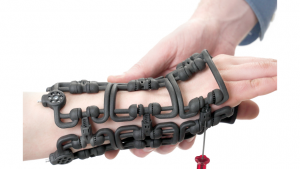Light is an essential commodity – but for many, clean, affordable and reliable sources of light are unavailable. For some rural communities, kerosene lamps are the only viable source of light once the sun sets. But continuous exposure to kerosene fumes can lead to a number of illnesses, including dermatitis and respiratory irritation. Kerosene lamps are also considered to be an expensive fire hazard. One company aims to solve this problem with a force readily available to all – gravity.
GravityLight is a portable device that does not require electricity, a battery, or fuel to produce light. The lamp is hung from a wall before its attached bag is filled with a heavy material like sand or rocks. The user then simply lifts the bag and lets it go. The weight slowly drops, pulling a notched belt through a series of gears to power a small motor, which powers the LED, generating light for about 25 minutes. Once the bag reaches the ground, users can simply lift it up again.
While the GravityLight illuminates a small section of the room, additional lights called SatLights can be attached to the main device and spread around the room or focused on a particular activity. Several of these SatLights can be daisy-chained around a room.
After conducting successful global trials with over 1300 families, GravityLight is expected to launch with Kenya as its hub: “As well as designing GravityLight to provide a clean, safe and affordable alternative to kerosene lamps, we also want to create local jobs, skills and livelihoods for those who make and sell GravityLights,” says the company.
“Although GravityLight will be available internationally, Kenya is a one of our launch markets for off-grid families. It represents a gateway to East Africa and has an emerging manufacturing industry, which we hope to help develop and grow.”
The product’s biggest drawback is its price. Coming in at around $10 each, it is out of reach for most struggling families, but according to the company, compared to the price of kerosene refills, the GravityLight would pay for itself in just a few months.







